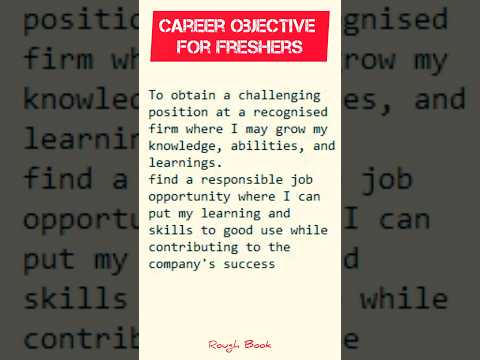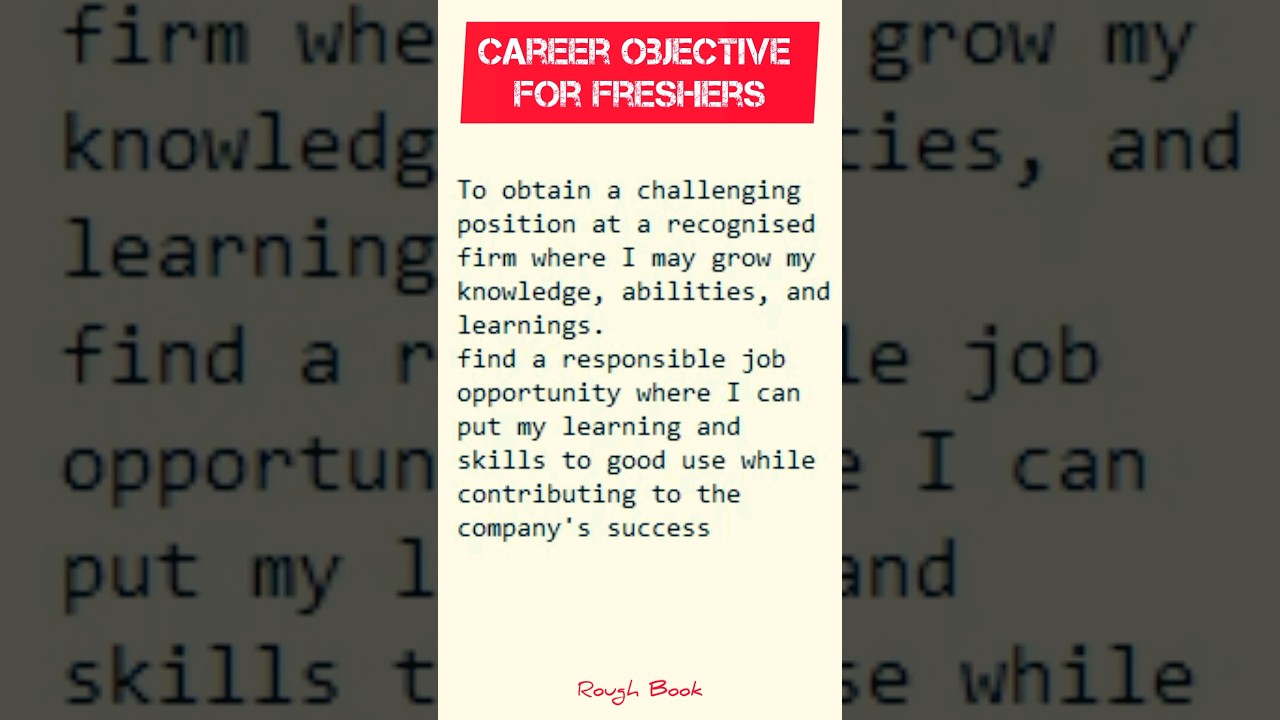A career objective is a statement that outlines your professional goals and aspirations. It serves as a roadmap that guides you towards your desired career path and helps you stay focused on achieving success. A well-crafted career objective provides clarity and direction, enabling you to make informed decisions about your career choices and development. It serves as a powerful tool to demonstrate your ambition, passion, and commitment to potential employers.
Having a clear career objective can ignite a sense of purpose and motivation within you. It inspires you to continuously strive for growth and improvement, pushing you to reach new heights in your chosen field. By defining your career objective, you gain a sense of direction that allows you to make intentional choices, such as selecting relevant educational opportunities or seeking out specific experiences that align with your goals.
A compelling career objective also showcases your potential to prospective employers. It highlights your vision and showcases your determination to excel in your profession. Employers are always on the lookout for candidates who possess a clear sense of purpose and are driven to succeed. A well-crafted career objective can grab their attention, making them interested in learning more about you and what you can bring to their organization.
In conclusion, a career objective serves as a powerful tool that not only keeps you focused and motivated but also captures the attention of potential employers. It is an essential element in your professional journey, guiding you towards achieving your goals and setting you apart from the competition.

Career Objective
| Definition | Importance | Examples |
|---|---|---|
| A career objective refers to a statement that outlines an individual’s professional goals and aspirations. | Having a well-defined career objective is crucial in guiding one’s career path and shaping long-term success. | 1. To secure a managerial position in a renowned organization where I can utilize my leadership skills to drive business growth. 2. To become a data scientist specializing in machine learning, enabling me to contribute to cutting-edge technological advancements. 3. To establish myself as a successful freelance writer, leveraging my creativity and passion for storytelling to create compelling content. |
| Characteristics | Components | Benefits |
| – It should be concise, specific, and tailored to one’s career goals. | – Clear statement of desired position or industry. – Mention of relevant skills, qualifications, or experiences. – Alignment with the organization’s mission or industry trends. |
– Provides focus and direction in career planning. – Helps in making informed decisions and setting realistic goals. – Enhances resume or CV, showcasing purpose and dedication. – Demonstrates commitment and ambition to potential employers. |
“Launching Ambitious Careers: A Fresh Perspective on Resumes”
What is a Career Objective?
A career objective is a statement that outlines your professional goals and aspirations. It is a concise and focused expression of what you hope to achieve in your career. A well-crafted career objective can help you stand out from other candidates and demonstrate your commitment to your chosen field.
Importance of a Career Objective
A career objective serves as a roadmap for your career journey. It provides clarity and direction, helping you stay focused on your goals. Additionally, a strong career objective can grab the attention of employers and show them that you are a motivated and driven individual.
Key Components of a Career Objective
1. Clarity: A career objective should be clear and concise. It should clearly state your career goals and the specific position or industry you are targeting.
2. Relevance: Your career objective should align with your skills, qualifications, and experience. It should demonstrate how your goals and aspirations fit within the context of your chosen field.
3. Specificity: Being specific in your career objective can help you stand out. Instead of stating a generic goal, such as “to work in a challenging environment,” try to be more specific about the type of challenges you seek and how you plan to overcome them.
4. Realism: While it is important to aim high, it is also crucial to set realistic goals. Your career objective should be achievable within a reasonable timeframe and should take into consideration your current level of experience and qualifications.
5. Measurability: A good career objective should be measurable. It should include specific milestones or achievements that you aim to accomplish in order to track your progress and evaluate your success.
How to Write a Compelling Career Objective
1. Research: Before writing your career objective, conduct thorough research about the industry and position you are targeting. This will help you tailor your objective to the specific requirements and expectations of the field.
2. Be Specific: Instead of using generic statements, be specific about your goals and aspirations. Highlight the skills, qualifications, and experiences that make you a suitable candidate for your desired position.
3. Show Passion: Employers are looking for individuals who are passionate about their chosen field. Use your career objective to showcase your enthusiasm and dedication for the industry.
4. Keep it Concise: A career objective should be brief and to the point. Avoid using unnecessary jargon or buzzwords that can dilute the impact of your statement.
5. Revise and Refine: After writing your career objective, take the time to revise and refine it. Make sure it accurately reflects your goals and aspirations, and that it effectively communicates your value as a potential employee.
Examples of Effective Career Objectives
1. To leverage my strong analytical skills and industry knowledge in a challenging data analysis role within the finance sector.
2. To obtain a leadership position in marketing, where I can utilize my creativity and strategic thinking to drive brand growth and market share.
3. To secure a position in healthcare administration, where I can apply my strong organizational skills and passion for improving patient care.
4. To contribute my expertise in software development to a dynamic tech company, where I can collaborate with a talented team to create innovative solutions.
5. To build a successful career in human resources, where I can utilize my interpersonal skills and experience in talent acquisition to attract and retain top talent.
In conclusion, a career objective is a powerful tool that can help you define and achieve your professional aspirations. By crafting a clear, relevant, and compelling career objective, you can demonstrate your commitment to your chosen field and increase your chances of success.

